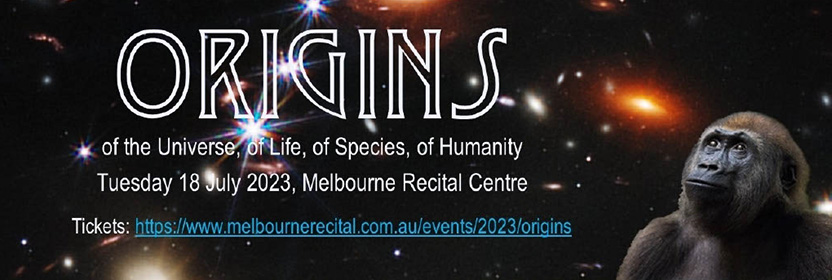
Academy Fellow Distinguished Professor Jenny Graves is well known for her work on animal genomes, the evolution of sex and sex chromosomes. But she’s also an experienced choral singer.
“Every time I perform in Joseph Haydn’s 1798 masterpiece, The Creation, I wonder why we are still singing about Adam and Eve, when there’s so much wonderful science to sing about,” Professor Graves said.
So she conceived a new full-length oratorio, Origins: of the Universe, of Life, of Species, of Humanity, as a secular successor to Haydn’s The Creation.

Professor Graves and fellow chorister-poet Leigh Hay co-wrote a libretto that tells the creation story through science, using the beautiful words and images from cosmology, molecular biology, evolutionary genetics, ecology and anthropology to describe our origins—from the Big Bang to the emergence of humanity.
The Heidelberg Choral Society, in which they both sing, commissioned Melbourne-born composer Nicholas Buc to compose the score and booked Melbourne’s premier concert hall, the Melbourne Recital Centre for 18 July, during the International Genetics Congress.

Now the challenge is to raise funds for the commission and performance, Professor Graves said.
“Origins is a unique work—a musical description of the fundamentals of molecular life and evolution has never been attempted before, at least not on this scale,” she said.

According to Professor Graves, it moves from ‘A Universe from Nothing’, through the exquisite intricacy of molecular life and the dramatic retelling of DNA discovery (starring Watson and Crick, with a plaintive aria from Rosalind Franklin) and Darwin and his hysterical hecklers, to sparkling descriptions (many drawn from famous Australian examples) of early life, selection, speciation and extinction.
It follows the rise of the third chimpanzee and man, the dominant mammal, presiding over the sixth extinction and asks if we too will perish.
It ends with the astronomer overlooking the galaxies, and expresses the hope that humans can yet understand the cosmos and our place in it, and keep our planet safe.
“We started rehearsals in April. The score is wonderful to sing; it is very varied, from the profound and beautiful to the dramatic to the frankly fun,” Professor Graves said.
“I found it overwhelming to see my thoughts and ideas given such depth. It’s even more exciting than platypus sex chromosomes!”
Her aim in creating Origins is to bring the beauty and wonder of science to the public, and to express some of the most profound scientific truths in inspirational music.
She noted that Origins will fill an oft-lamented gap in the choral repertoire for major contemporary secular works, and she hopes it will be performed in Australia and overseas for decades to come.
Origins will be premiered at the Melbourne Recital Centre on 18 July 2023 by the 100-voice Heidelberg Choral Society, full orchestra and professional soloists under the baton of well-known conductor Peter Bandy.
“It will be a night to make scientists and non-scientists think, despair, laugh and celebrate the role of science in our understanding and stewardship of our beautiful little planet,” Professor Graves said.
Read more about the work and premiere, and perhaps support this unique adventure through the choir’s webpage or by contacting Professor Graves at j.graves@latrobe.edu.au.
© 2025 Australian Academy of Science